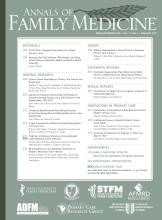The articles in this issue develop 2 themes: risk assessment and care management.
The risks identified in these studies relate to anger and the progression of prehypertension to hypertension and coronary heart disease,1 development of diabetes among young adults,2 suicide risk assessment among standardized patients portraying either major depression or adjustment disorder,3 and risk for domestic violence.4
Two systematic reviews examine both risk and clinical management. One identifies racial differences in the efficacy of antihypertensive therapy.5 The other assesses differences in international guidelines for management of acute sore throat.6
Several other studies inform our clinical management of patients. For example, Bayliss and colleagues7 discover barriers to self-management of chronic diseases, many of which are mutable.
Howard and colleagues8 find that among 1,245 patients of 36 practices in Thunder Bay, Ontario, patient satisfaction with after-hours care of an urgent problem is higher if provided by patients’ own family physician or their physician’s after-hours clinic, compared with a walk-in clinic, the emergency department, and telephone health advisory services. This study can inform the proliferation of less personal sources of after-hours care in many countries.
A clinical trial of a 6-hour vs 2-hour continuing education intervention finds varied effects on communication with patients with breast cancer.9
Two essays propose innovative staffing models for making feasible the growing opportunities in management of chronic illness in patients.10,11 We feature these articles together in the Annals Journal Club,12 and encourage creative discussion about health care reform at both the system and practice level that could enable these and other innovations.
With this issue, the Annals welcomes the College of Family Physicians of Canada as a new sponsoring organization. We are delighted by the CFPC’s show of support for our mission of advancing knowledge essential to understanding and improving health and primary care. As always, we are honored by the many collaborative efforts that make the Annals possible.
Please share your insights by joining the Annals online discussion at http://www.AnnFamMed.org.
- © 2007 Annals of Family Medicine, Inc.







